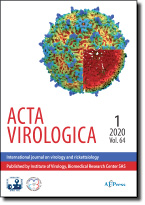Acta Virologica Vol.62, No.2, p.129-136, 2018
|
| Title: RSV infection in a macrophage-cell line activates the non-canonical NF-κB pathway and induces pro-inflammatory cytokine expression |
| Author: O. DEL MORAL-HERNÁNDEZ, C. SANTIAGO-OLIVARES, E. RIVERA-TOLEDO, J. GAONA,
E. CASTILLO-VILLANUEVA, B. GÓMEZ |
|
Abstract: Respiratory syncytial virus (RSV) is a highly prevalent infectious agent that causes severe respiratory tract illnesses in infants and children worldwide. Children who have suffered severe RSV infections during infancy are prone to develop recurrent episodes of wheezing and asthma that may be associated with viral persistence. RSV infections in humans and animal models are characterized by extensive inflammatory responses. Epithelial cell lines acutely infected by RSV have shown activation of the NF-κB signaling through two independent pathways: the canonical pathway, mediated by RelA and p50 subunits, and the non-canonical pathway, mediated by the subunits RelB and p52. Herein, we investigated the state of activation of the canonical and non-canonical NF-κB signaling pathways in macrophages either acutely or persistently infected by RSV and examined the expression of pro-inflammatory mediators. Activation of NF-κB subunits was analyzed through Western blot assays using acutely RSV-infected epithelial cells as a control. The expression levels of two pro-inflammatory cytokines and a chemokine were determined by quantitative RT-PCR and through immunobead assays. The results showed that p52 was abundant during acute and persistent RSV infection, indicating that macrophages predominantly activate the non-canonical pathway. We also observed activation of IL-1β, TNF-α and CCL5/RANTES transcription, though at higher levels in persistently infected macrophages than in acutely infected macrophages. In contrast, the protein levels of these cytokines/chemokine did not correlate with their mRNA transcription, as quantitation displayed higher levels during acute infection than in persistent infection, suggesting post-transcriptional regulation by RSV persistence.
|
|
| Keywords: RSV-persistence; NF-kB canonical pathway; NF-kB non-canonical pathway; macrophages; pro-inflammatory cytokines |
|
|
Published online: 07-Jun-2018
|
| Year: 2018, Volume: 62, Issue: 2 |
Page From: 129, Page To: 136 |
doi:10.4149/av_2018_202
|
|
 download file download file |
|
|
|
|
 download file
download file
